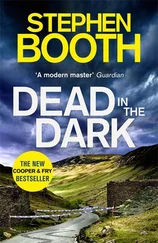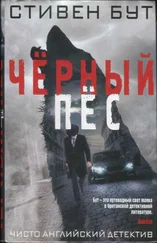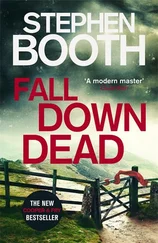‘As I understand it, she was planning to get a taxi from the house at 360B Darlaston Road, Bearwood, to New Street railway station in Birmingham.’
‘Yes.’
‘Are you certain she was getting a taxi? It’s only a few miles. Might she have caught a bus, as she did when she went in to college?’
‘I don’t think so, do you?’ said Sarah.
‘Well, I don’t know, Mrs Renshaw. Emma was a student — she might have decided she couldn’t afford a taxi. If she was a fit girl, she might have preferred to walk to the bus stop, even with her bags.’
‘But the others said she was getting a taxi.’
‘But did Emma tell you that herself?’
Sarah looked at her husband for guidance, but he shook his head. ‘Well, I don’t think so. Not in so many words.’
‘OK, thank you. Now, we believe Emma was due to catch a train from New Street station a few minutes before eleven o’clock that morning, and she would have to change at Manchester Piccadilly to get to Glossop, where you were supposed to collect her at twenty past one.’
‘That’s right. We tried to call her mobile phone, but we only got the message service.’
‘Mrs Renshaw, would you have expected Emma to have phoned you at some stage?’
‘Well, if her train was late, or she missed one...’
‘But before that? Wouldn’t you have expected her to phone to tell you she was setting off? Or to call you from the train? Or to let you know she’d arrived at Manchester?’
‘Well, perhaps. But she might not have been able to reach us,’ said Sarah. ‘I think I was in and out of the house all morning. I had some shopping to do, because we were having a dinner party to celebrate Emma coming home, and there were a few things I had to get.’
‘No messages? You have an answering machine?’
‘Call Minder. But there were no messages. Anyway, I think Emma would have been more likely to ring Howard’s mobile, since she knew he was driving to collect her at Glossop. But Howard was out on business all morning. You had some meetings, didn’t you, dear?’
‘Yes. I was trying to pack everything into the morning, so I was very busy.’
‘No voice mails?’
Howard shook his head.
‘In fact, it was a bit of a rush for Howard to get back here and pick up me up before he drove to Glossop,’ said Sarah, with a smile. ‘He arrived a bit stressed, poor man, because he’d been battling through the traffic in Sheffield and he thought he was going to be late. He said it would have been easier for him to have gone to Glossop on his own, but I wanted so much to be there to meet Emma.’
Fry wanted to stare at Howard Renshaw to see what she could read in his face, but she resisted the temptation.
‘So you both went to Glossop to meet your daughter. You hadn’t heard from her, so you assumed she was arriving on the twenty past one train. And when she didn’t get off the train, you waited for the next one.’
‘Yes.’
Fry had a painful image of Sarah standing on the station platform at Glossop, getting excited as the diesel units pulled in from Manchester, her hand already half-raised, ready to wave the moment she set eyes on her daughter. And when Emma didn’t arrive? Had Howard reassured his wife, checked the time of the next train, and taken her across the road for a coffee while they waited? How had he coped as the hours dragged on, and Emma still hadn’t appeared? How had Sarah herself coped?
But Fry didn’t need to wonder about that. Sarah had remained hopeful. Her hope had never died — it still shone from her face now, as she was obliged to go over the story for the umpteenth time.
Every time she spoke to the Renshaws, Fry found their air of belief palpable, even contagious. A few minutes later, as she was sitting in their lounge talking about Emma, someone rang the doorbell. Both the Renshaws gave a sharp intake of breath, and Sarah looked immediately at the clock. While Howard jumped up and went to the door, his wife fussed with the cushions and smoothed her dress, as if an important visitor were about to walk in.
The expectation was so strong inside the room that Fry felt obliged to get out of her chair to look out of the window. She half-expected to see Emma herself standing in the drive, two years older than her photos, but restored to living flesh and still wearing the blue jacket and jeans that Fry had so often seen mentioned in interview reports. But it wasn’t Emma Renshaw. Instead, it was a pale woman in a green jacket.
‘Who was that?’ she said, when Howard returned.
‘Gail Dearden. She had some news.’
‘Oh?’
‘Another sighting.’
‘Of what?’
‘Of who,’ Sarah corrected her with a smile. ‘Gail helps us to collect cuttings for the album.’
‘What album is this?’ said Fry, with a sinking feeling.
The album was sitting right there on a bookshelf. It was a thick volume with heavy blue covers that had been well-thumbed. Howard picked it up almost reverentially and passed it to her, with a glance at Sarah for her approval.
Reluctantly, Fry opened the album and glanced at the first few pages. She had been right to be apprehensive. A few minutes ago, she had casually remarked that the Renshaws couldn’t keep up with every single missing or homeless girl in the world. Mrs Renshaw had said that they could try. And boy, how they were trying.
‘Take it away with you for a while,’ said Sarah. ‘There are plenty of possibilities for you there, I think.’
Back at the station in West Street, DC Gavin Murfin was watching the TV news with two other detective constables. They were waiting to see an interview with DCI Kessen about the Neil Granger enquiry.
‘What’s all the interest?’ said Ben Cooper, draping his jacket over a chair.
‘We’ve got a bet on about how many times he states the bleedin’ obvious,’ said Murfin. ‘I’m backing him for a full half-dozen.’
‘Oh. Well, for goodness’ sake, don’t let Diane catch you.’
‘Nah. She’s miles away. She’s gone to see the Renshaws again. They’ll be skipping happily through Wonderland together for a while yet.’
‘Well, be discreet, Gavin.’
‘Hey, here he comes,’ said Murfin. ‘Somebody get a notebook out and write them down.’
‘The murder of a young man is totally unacceptable,’ said DCI Kessen from the screen.
‘There you go!’ said Murfin. ‘That’s a cracking start. In fact, I think it should count as two.’
‘No way,’ said one of the other DCs.
‘Well, no worries. He’s got plenty of time, like.’
‘The police will be taking measures to identify the person responsible for this crime.’
‘Two!’
‘And we’re hoping to get the full co-operation of the public in this matter.’
‘Three!’
‘Hold on.’
‘That’s obvious, isn’t it?’
‘Not to the public.’
‘True, my son. But we’re not the public, are we? If I was having a bet with the general public, it’d be different, like.’
‘Make it half a point.’
‘Give over.’
‘Shh!’
‘Neil Granger’s family and friends are very distressed,’ DCI Kessen was saying, ‘and everyone who knew him will be saddened by what has happened.’
‘Four. And five,’ said Murfin. ‘That’s my boy. Now see him go for the big finish.’
‘We’re keeping an open mind on the motive for this crime.’
‘No,’ said the DC. ‘Not that one.’
‘Mmm.’
‘But we’d very much like to hear from anyone who was in the vicinity of Withens Moor on Friday night or early Saturday morning.’
‘I hope you’re not going to let me down, sir,’ said Murfin. ‘There’s a pint of beer riding on this.’
‘He’s not going to do it,’ said the DC. ‘Start getting your money out, Gavin.’
Читать дальше
Конец ознакомительного отрывка
Купить книгу












